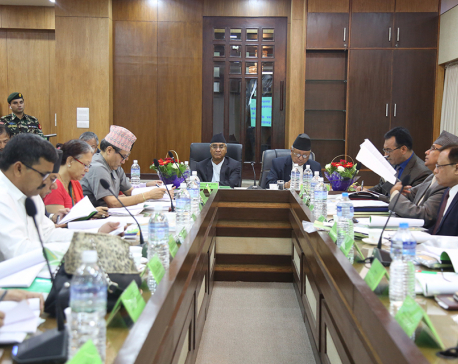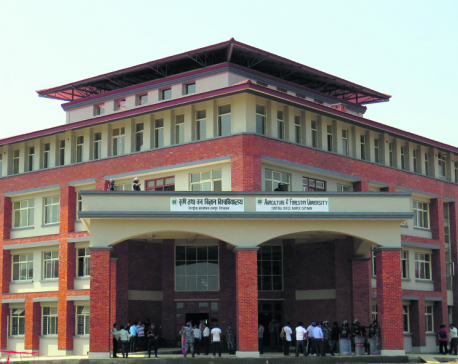
OR
Opinion
Building back stronger with nature
Published On: September 14, 2021 07:00 AM NPT By: Lily Shrestha and Nabin Bhattarai


Lily Shrestha and Nabin Bhattarai
The authors are with the International Centre for Integrated Mountain Developmentnews@myrepublica.com
More from Author
Investments in forestry, ecotourism and organic agriculture could help in resilient recovery from the pandemic
Besides leaving a huge impact on public health, the COVID-19 pandemic and the restrictions to control its spread, have affected the economy, environment, and livelihoods.The consequences have been particularly severe for low- and middle-income countries like Nepal since the economy and livelihoods are highly dependent on agriculture, and a few industries, and services such as tourism and trade.The restrictions on these and other small-scale enterprises have resulted in widespread loss of jobs and earnings and increase in poverty. Due to the loss in jobs and income, people are returning to their villages from cities and towns. As a result, rural populations are having to increasingly rely on natural resources and forest produce for subsistence as well as income.
The growing dependence on natural resources has led to over extraction and resource degradation and an uptick in the number of cases of illegal logging, hunting, and forest encroachment in different parts of Nepal.Poor security during the lockdown has also led to a spurt in illegal activities even in conservation areas and community forests. On the other hand, the revenues generated from tourism,crucial for supporting conservation activities in protected areas,have dried up given the restrictions on travel.
Assessing costs and recovery pathways
The costs of the pandemic and restrictions on the economy, livelihoods and the environment have been very high.This has forced a rethink on business as usual and there is a growing global consensus on the need to reorient our consumption patterns, production systems and the overall economy in more environmentally friendly and sustainable ways. More importantly,the pandemic has forced us to re-examine our relationship with nature, given that there are clear links between emerging infectious diseases, habitat degradation and wildlife trade.
Post-pandemic recovery should help achieve the dual goals of economic revival and ecosystem restoration.Here, investments in forestry and nature-based tourism can help address livelihood and economic issues and help restore the environment. This is particularly relevant for a country like Nepal,with its rich natural resources and significant rural population.
Forestry and livelihoods
Investing resources in forestry could be a major recovery option for Nepal since forest cover has been increasing and now stands at 44.74% of the country’s total land area. Here, forestry should be managed so that commercial utilization and conservation can go hand in hand, creating jobs and income for the local community. This strategy is already outlined in the Forest Sector Strategy 2016-2025 of the Government of Nepal which aims for sustainable forest management and creation of livelihood opportunities.
Sustainable forest management can contribute to the global conservation agenda and Nepal’s commitments under various multilateral environmental agreements such as the UN Decade on Ecosystem Restoration, Sustainable Development Goals, and the United Nations Framework Convention on Climate Change. An example of how sustainable forest management could be a solution for post-pandemic recovery in Nepal can be observed through successful community forestry projects. A study conducted in 105 community forests in Chitwan, Gorkha and Dolakha districts of Nepal indicated that community forestry has resulted in an increase in forest carbon stocks, with an average increase of 5.1 MgC/ha/yr between 2010 and 2013. In addition, local communities have benefited from their stewardship of these forests through the collection and sale of forest produce. Other options could be to monetize some of these gains in carbon stocks to further incentivize forest restoration.
Ecotourism and organic farming
Tourism contributes significantly to the economy and local livelihoods and was one of the sectors hardest hit by the pandemic. The post-pandemic recovery plan for tourism needs to integrate principles of ecotourism that combine enhanced tourist experience with livelihood opportunities, conservation education, and environmental protection. Some community-based ecotourism projects in Nepal, such as the one in Ghandruk Of the Annapurna Conservation Area,have resulted in better income opportunities for host communities, created jobs, showcased local culture, and promoted environmental awareness. More than one-third of the population in Ghandruk village are dependent on tourism for income and the entire community has benefitted from infrastructure development in the area. Environmental improvement from ecotourism activities in the area include biodiversity conservation, increase in forest cover, and growing use of alternative energy sources. Further, the development of ecotourism in the area has also contributed to maintaining peace and conserving the local culture.
Organic farming is another feasible option for a country like Nepal where an integrated crop-livestock agricultural system is widely practised. Promotion and scaling up of organic farming with high value and nutritious mountain crops such as fruits, cardamom, coffee, mushrooms, honey and medicinal herbs can create opportunities for integrated economic and environmental recovery.Some of these organic products are already being exported to international markets. Organic farming not only contributes to environmental conservation through the reduced use of synthetic fertilizers and pesticides, but also has various other benefits ranging from improvement in the quality of food and nutrition, and thus public health outcomes, to an increase in agricultural production as the market demand for organic products grows.
A green and resilient recovery
Nepal can greatly benefit from fostering a vibrant small business and enterprise ecosystem around ecotourism, forestry, organic food and mountain niche products. These rural small businesses can provide employment opportunities for local youth, including many returnees with diverse skill sets, build local entrepreneurship, and contribute to local economy and conservation. These benefits could be further enhanced with the integration of other conservation approaches like springshed management and wetland conservation in the recovery plans. Incorporation of these conservation activities would not only complement the recovery options of ecotourism, forestry and organic agriculture, but contribute equally to climate change adaptation and mitigation, as well as ecosystem restoration and biodiversity conservation.
Incorporating and implementing such strategies for post COVID-19 recovery will make the local communities and economies resilient to future shocks, strengthen domestic production, and address environmental issues such as climate change and biodiversity loss.
You May Like This

Study of agriculture and forestry in priority: PM Deuba
KATHMANDU, September 6: Prime Minister Sher Bahadur Deuba has said that the study, teaching, research and extension of agriculture and forestry... Read More...

All activities of Agriculture and Forestry University, Rampur, halted
RATNANAGAR (Chitwan), August 7: All activities of Agriculture and Forestry University, Rampur, have been halted for the past one week... Read More...

Agriculture and Forestry University finally gets administrative building
CHITWAN, May 20: Agriculture and Forestry University (AFU) in Rampur of Chitwan now boasts of a new administrative building. ... Read More...




Just In
- Insurers stop settling insurance claims after they fail to get subsidies from government
- Nepal-Qatar Relations: Prioritize promoting interests of Nepali migrant workers
- Health ministry to conduct ‘search and vaccinate’ campaign on May 13
- Indian customs releases trucks carrying Nepali tea, halted across Kakarbhitta
- Silent period for by-election to begin from midnight
- SC issues short-term interim order to govt and TU not to take immediate action against TU legal advisor Khanal
- National consultation workshop advocates to scale up nutrition smart community in Nepal
- Patan High Court issues short-term interim order to halt selection process of NTB’s CEO













Leave A Comment